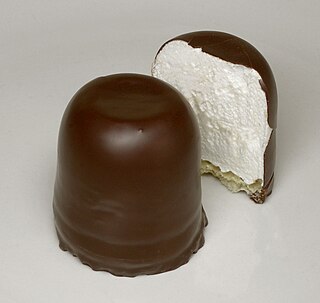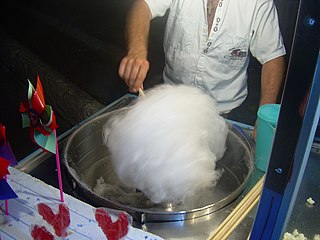Related Research Articles

Confectionery is the art of making confections, or sweet foods. Confections are items that are rich in sugar and carbohydrates although exact definitions are difficult. In general, however, confections are divided into two broad and somewhat overlapping categories: bakers' confections and sugar confections.

Chocolate-coated marshmallow treats, also known as chocolate teacakes, are confections consisting of a biscuit base topped with marshmallow-like filling and then coated in a hard shell of chocolate. They were invented in Denmark in the 19th century under the name Flødeboller, and later also produced and distributed by Viau in Montreal as early as 1901. Numerous varieties exist, with regional variations in recipes. Some variants of these confections have previously been known in many countries by names comprising equivalents of the English word negro.

Cotton candy, also known as candy floss (candyfloss) and fairy floss, is a spun sugar confection that resembles cotton. It is made by heating and liquefying sugar, and spinning it centrifugally through minute holes, causing it to rapidly cool and re-solidify into fine strands. It usually contains small amounts of flavoring or food coloring.

Kiwiana are certain items and icons from New Zealand's heritage, especially from around the middle of the 20th century, that are seen as representing iconic New Zealand elements. These "quirky things that contribute to a sense of nationhood" include both genuine cultural icons and kitsch.

Cassie Dawin Campbell-Pascall is a former Canadian ice hockey player and a broadcaster for ESPN/ABC, and formerly Sportsnet. Born in Richmond Hill, Ontario, Campbell grew up in Brampton, Ontario, playing for the Brampton Canadettes. She was the captain of the Canadian women's ice hockey team during the 2002 Winter Olympics and led the team to a gold medal. The left winger took on the role of captain again in the 2006 Winter Olympics in Turin, Italy, and again successfully led her team to a gold medal with a 4 – 1 win over Sweden.
Wonka was a confectionery brand owned and licensed by the Swiss corporation Nestlé. In 2018, the branding and production rights were sold to the Ferrero Group.

Amcor plc is a global packaging company. It develops and produces flexible packaging, rigid containers, specialty cartons, closures and services for food, beverage, pharmaceutical, medical-device, home and personal-care, and other products.

Reese's Peanut Butter Cups are an American candy by the Hershey Company consisting of a peanut butter filling encased in chocolate. They were created on November 15, 1928, by H. B. Reese, a former dairy farmer and shipping foreman for Milton S. Hershey. Reese was let go from his job with Hershey when the Round Barn which he managed was shut down for cost-saving measures. He subsequently decided to start his own candy business. Reese's are a top-selling candy brand worldwide, with $3.1 billion in annual sales.

Plastic shopping bags, carrier bags, or plastic grocery bags are a type of plastic bag used as shopping bags and made from various kinds of plastic. In use by consumers worldwide since the 1960s, these bags are sometimes called single-use bags, referring to carrying items from a store to a home. However, it is rare for bags to be worn out after single use and in the past some retailers incentivised customers to reuse 'single use' bags by offering loyalty points to those doing so. Even after they are no longer used for shopping, reuse of these bags for storage or trash is common, and modern plastic shopping bags are increasingly recyclable or compostable - at the Co-op for example. In recent decades, numerous countries have introduced legislation restricting the provision of plastic bags, in a bid to reduce littering and plastic pollution.

TerraCycle is a private U.S.-based recycling business headquartered in Trenton, New Jersey. It primarily runs a volunteer-based recycling platform to collect non-recyclable pre-consumer and post-consumer waste on behalf of corporate donors, municipalities, and individuals to turn it into raw material to be used in new products. TerraCycle also manages Loop, a consumer-products shopping service with reusable packaging.

Cadbury's Chocolate Factory, also known as Cadbury's Claremont and colloquially as Cadbury's, is a prominent Australian chocolate factory situated in Claremont, Tasmania. Producing a company-record of over 60,000 tonnes of chocolate in 2021, it has earned distinction as "the largest chocolate factory in the southern hemisphere". Established in 1921, the factory and surrounding model village estate marked Cadbury's first business expansion outside the United Kingdom. The facility is currently owned by the multinational conglomerate Mondelez International, which purchased Cadbury in 2010.
Paddle Pop is a brand of ice confection products originally created by Streets, which is now owned by the English-Dutch company Unilever. It is sold in Australia, New Zealand, and a few other countries. It is held for eating by a wooden stick which protrudes at the base. The brand has a mascot known as the Paddle Pop Lion, or Max, who appears on the product wrapper.

Heinz Tomato Ketchup is a brand of ketchup manufactured by the H. J. Heinz Company, a division of the Kraft Heinz Company.

Pineapple lumps or pineapple chunks are a chocolate-covered confection with a soft, chewy pineapple-flavoured middle from New Zealand. They are often identified as Kiwiana.

Sustainable packaging is packaging materials and methods that result in improved sustainability. This involves increased use of life cycle inventory (LCI) and life cycle assessment (LCA) to help guide the use of packaging which reduces the environmental impact and ecological footprint. It includes a look at the whole of the supply chain: from basic function, to marketing, and then through to end of life (LCA) and rebirth. Additionally, an eco-cost to value ratio can be useful The goals are to improve the long term viability and quality of life for humans and the longevity of natural ecosystems. Sustainable packaging must meet the functional and economic needs of the present without compromising the ability of future generations to meet their own needs. Sustainability is not necessarily an end state but is a continuing process of improvement.

A candy pumpkin is a small, pumpkin-shaped, mellow crème confection primarily made from corn syrup, honey, carnauba wax, chocolate, and sugar. Traditionally colored with an orange base and topped with a green stem to make candy pumpkins largely identifiable with Halloween, a candy pumpkin is considered a mellow crème by confectioners since the candy has a marshmallow flavor. Sometimes called candy corn's first cousin, candy pumpkins are made through a starch casting process similar to that for candy corn. Brach's candy pumpkin, known by the trademarked name "Mellowcreme" Pumpkins, is the most popular candy pumpkin. Brach's Confections is now owned by Ferrara Candy Company.

Sherbet is a fizzy, sweet powder, usually eaten by dipping a lollipop or liquorice, using a small spoon, or licking it from a finger.

Pascall is an Australian and New Zealand confectionery brand, which is owned by Mondelēz International.
Prizes are promotional items—small toys, games, trading cards, collectables, and other small items of nominal value—found in packages of brand-name retail products that are included in the price of the product with the intent to boost sales, similar to toys in kid's meals. Collectable prizes produced in series are used extensively—as a loyalty marketing program—in food, drink, and other retail products to increase sales through repeat purchases from collectors. Prizes have been distributed through bread, candy, cereal, cheese, chips, crackers, laundry detergent, margarine, popcorn, and soft drinks. The types of prizes have included comics, fortunes, jokes, key rings, magic tricks, models, pin-back buttons, plastic mini-spoons, puzzles, riddles, stickers, temporary tattoos, tazos, trade cards, trading cards, and small toys. Prizes are sometimes referred to as "in-pack" premiums, although historically the word "premium" has been used to denote an item that is not packaged with the product and requires a proof of purchase and/or a small additional payment to cover shipping and/or handling charges.

Funny Face was a brand of powdered drink mix originally made and publicly sold by the Pillsbury Company from 1964 to 1994, and in limited productions from 1994 to 2001. The brand was introduced as competition to the similar Kool-Aid made by Kraft Foods. The product came in assorted flavors sweetened with artificial sweetener, and was mixed with water to make a beverage.
References
- 1 2 3 "End of the line for iconic Kiwi lollies". Manawatu Standard . 18 September 2008. Archived from the original on 14 October 2012. Retrieved 17 November 2011.
- ↑ "Say goodbye to Snifters, Sparkles and Tangy Fruits – Audio". 3 News . 18 September 2008. Archived from the original on 24 March 2012. Retrieved 17 November 2011.
- ↑ Price, Rosanna (26 June 2015). "Pascall's Licorice Allsorts just the latest treat to disappear" . Retrieved 7 June 2023– via Stuff.